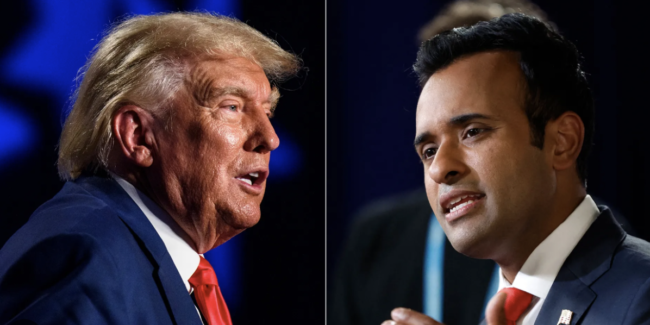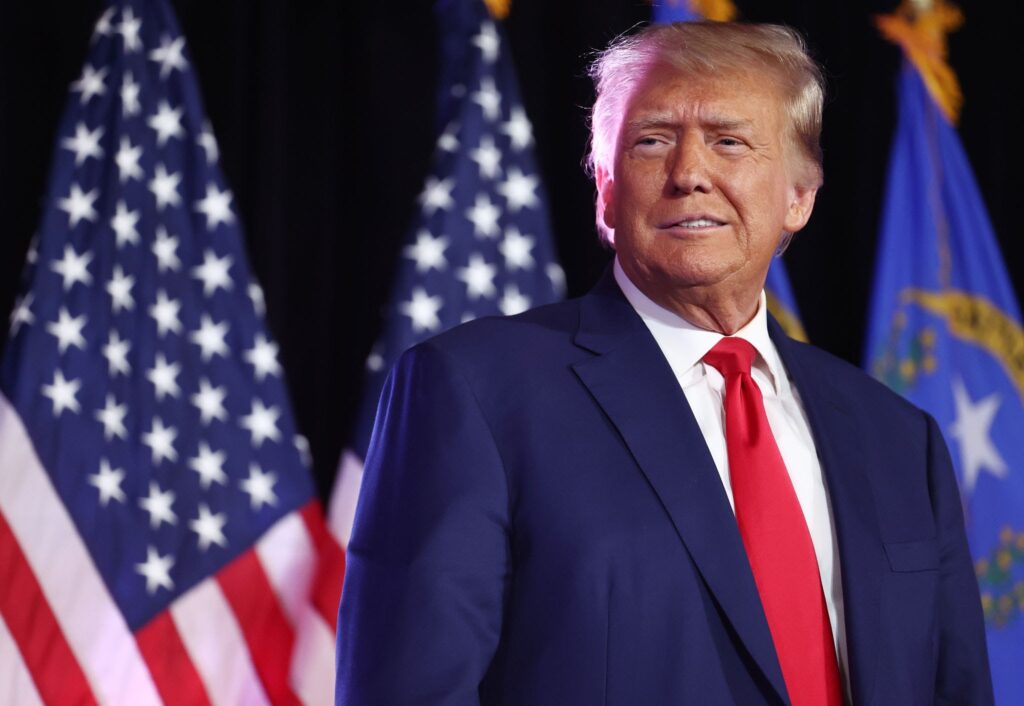Donald Trump:
Former U.S. President Donald Trump is back and seeking the 2024 Republican presidential nomination. Many politicians have lined up, attempting to compete with Trump for the Republican nomination—some being wealthy individuals with little to no chance; others are established elected officials with sensible explanations as to why they believe they would make a successful president. According to FiveThirtyEight polls, Trump at 55.2% is favored to win amongst the Republican voters, despite his numerous acts of alleged misconduct.
But why?
Trump is currently facing an array of 91 criminal charges, all of differing severity and importance. The first, and least significant (according to popular opinion) of Trump’s indictments is the New York state case of falsifying business records in an attempt to allegedly conceal a hush money payment of $130,000 to Stormy Daniels. The Manhattan District Attorney, Alvin Bragg alleges that Trump partook in an illegal plan to keep Daniels from revealing their affair to the public through his accomplice and personal attorney at the time, Michael Cohen. Essentially, this case accentuates Trump’s recurring instances of fabrication and deceit without revealing vast national security concerns, unlike instances about his other cases. This charge has always had a very weak legal basis, and according to Fieldston Economics and Form IV US History Teacher, Dr. Heideman, “[it is] simply trivial in comparison with some of the other indictments.”
In June of 2023, Trump was indicted by a federal grand jury in the state of Florida for removing classified documents about national defense after leaving the White House. More noteworthy though, was Trump’s obstruction and refusal to comply with FBI efforts to recover the documents. Dr. Heideman states that “[Trump] could have avoided this case fairly easily, but his petulance towards the institutions requesting the documents was so gratuitous that ignoring it was not viable.” It is important to consider why Trump was reluctant to hand over the classified documents to law enforcement and what this could theoretically mean.
The 2020 federal election case will be a key factor in defining what exactly a politician is capable of doing to reverse a loss. The outcome of this case will hold vast ramifications for the 2024 election and any in the future. As Dr. Heideman puts it, “…they cut to the heart of Trump’s greatest crime: his attempt to prevent the peaceful transfer of power after the election. Given the ultimately violent form this attempt took on January 6th, it represents the most serious threat to American democracy since Richard Nixon’s attempts to secure his re-election in 1972.” How could the potential future of U.S. democracy be affected by a possible dismissal of this case?
On August 14, 2023, a grand jury based in Atlanta indicted Trump along with 18 other individuals on state charges for their alleged attempt to reverse his 2020 electoral loss. This case, led by Fulton County District Attorney Fani Willis, accuses Trump in partnership with several co-conspirators, of participating in acts of racketeering, coercing public officials to breach their promises under oath, impersonation of a public officer, conspiracy to commit forgery, composing falsified statements and filing false documents. Additionally, it is important to note that since this crime is being prosecuted under state law, if Trump were to be re-elected in 2024, he would not be capable of pardoning himself or his conspirators from any state law convictions.
Despite all these factors, Trump is still running for president again and holds a significant lead over the other Republican candidates. As it may come as a surprise for some, the state and federal charges against Trump have had little to no effect on the 2024 presidential election at this point, according to a variety of surveys. Form IV student Grant Bennett commented, “[the] Trump indictments will never affect his hardcore voters because they believe that he is being falsely accused…the more they go after him, the more he becomes a martyr.” Additionally, polls from FiveThirtyEight demonstrate that Trump has gained the support of 61% of “very conservative” Republican primary voters, which is up from a recorded 27% before the 2016 election. Trump has somewhat reinvented the idea of being a conservative and has begun merging the idea of “Trumpism” with conservatism to become synonymous in the thoughts of Republican voters. Trump’s following is likely going to continue to grow as he leads with his goal “to make America great and glorious again.”
Vivek Ramaswamy:

Before just recently entering into the political world, 38-year-old Vivek Ramaswamy ran a successful biotech company called Roivant Sciences, wrote a book titled “Woke, Inc.” detailing why politics does not belong in business and founded Strive Asset Management. Forbes approximates his net worth at $950 million. So, why does he want to run for president, specifically against other more politically seasoned candidates such as Donald Trump and Ron DeSantis?
Ramaswamy argues, in one of his strongest political beliefs, that America needs to resuscitate its national identity in order to unite our divided country. He explains that Americans have lost their civic pride and duty. Ramasmawy himself embodies the American Dream. He is a child of Indian immigrants who settled in Cincinnati, Ohio. He graduated as valedictorian of his high school class of 2003, attended Harvard, and then Yale Law School. He believes that we should not be hyper-fixated on our race, sexual identity and other attributes of diversity. Rather, Americans should be united by a core set of Constitutional values that our government is representative of the people and for the people. To this end, he will seek to eliminate 75 percent of the federal government, including the FBI, CIA and Department of Education, to minimize the power of non-elected government officials, often referred to as the “Deep State.” In Ramaswamy’s words, “There are three branches of the United States government, not four.” Like Trump, part of Ramaswamy’s rapidly rising appeal is his confident, unapologetic rhetoric style. Also, like Trump, many of his policies are MAGA 2.0, with the main difference being that Ramaswamy seeks to unify rather than divide the country.
Although a successful businessman, Ramaswamy’s economic policy has alarmed some voters. Dr. Heideman, commented, “His call for the Federal Reserve to maintain the value of the dollar vis a vis a basket of commodities would result in a tremendous amount of needless economic destruction since many commodity prices are themselves volatile, and even previously stable commodities can easily become volatile in the future. Even conservative think tanks have recognized his proposal as amateur hour.”
While some argue that Ramaswamy’s policy highlights his lack of familiarity with monetary policy, others say the President does not have much immediate economic influence without bipartisan support. Therefore, the most crucial issue for the next President may be foreign policy. For example, should the U.S. continue to support Ukraine in its conflict against Russia? Ramaswamy says it will escalate into World War III if the U.S. gets more entangled and that we must mediate an end to the conflict as soon as possible. Furthermore, American support in endless foreign wars has been fiscally irresponsible. The U.S. government is spending too much money as our debt levels spiral out of control. At the current course, our entitlement programs, Medicare and Social Security, are near bankruptcy, and we will soon need to borrow money to pay off the interest just to service our debt. If the U.S. defaults on its debt repayments, what happens then?
According to FiveThirtyEight polls, Trump is clearly in the lead at 55.2% of Republican voters, DeSantis at 13.2% and Ramaswamy at 7.4%. As long as the Trump indictments do not practically prevent him from winning the Republican primaries, he will evidently be the GOP candidate running against Biden in 2024. Although the gap between DeSantis and Ramaswamy is quickly dissipating, especially after the first Republican debate, both Republican candidates remain very distant behind Trump. So, why is Ramaswamy, the youngest major Republican presidential candidate, running?
Dr. Heideman explains, “Ramaswamy is playing politics on easy mode…[he] isn’t trying to become president, so he can just be Trump’s hype-man, and build his popularity that way…His book is now selling far more than it would have without his campaign, for example. Even more importantly, and less recognized, one of Ramaswamy’s main business endeavors at this point is an “anti-woke” investment fund, Strive Assets Management. This fund aims to position itself as an alternative to the much larger funds, like Blackrock or Vanguard, that use ESG (Environmental, Social and Governance) guidelines to make investments. Strive has grown alongside Ramaswamy’s rise in the media, reaching $1 billion in funds under management.







